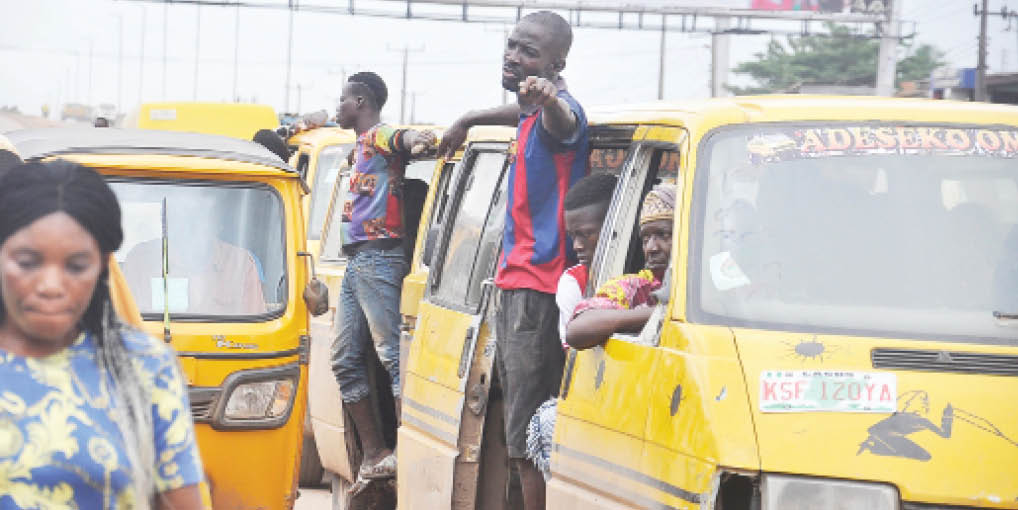The newly imposed levy of N800 daily on all transporters in the state would have been a welcome initiative in an organised transportation setting, but for the chaotic and complex nature of the Lagos transport ecosystem where the agbero (touts) reign supreme, the case is different.
This is the fear of the popular danfo (minibus) drivers which the system actually targets. They said while the government’s intention was to harmonise the levy and charges they paid on a daily basis, the proposal did not factor the “settlement” for agbero at each of the parks in the state.
The Lagos Transportation System is fraught with a lot of confusion and uncertainties. In the absence of an enduring transportation master plan and a mass transit system, the danfo has become the face of the state, dotting the nooks and crannies of the centre of excellence.
But for the big boys, the agbero of this world, the commercial buses are their source of income even though they are neither drivers nor bus conductors
On a daily basis, bus drivers and conductors are always at loggerheads with the agbero at every bus stop. As they pick passengers, even if it is one passenger, the driver must compulsorily pay the agbero who rake in millions of naira on a daily basis.
But with the new policy announced by the government during a recent stakeholders’ meeting, there are fears that the proposed levy would be an additional burden on the drivers.
The state government and the transport stakeholders last month signed the agreement for the collection of “Consolidated Informal Sector Transport Levy”, which according to the government, is designed to harmonise dues collected by government from commercial motorists at parks and garages across the state.
The agreement was signed between the state government on one side and local governments and various transport unions on the other.
The Commissioner for Finance, Dr Rabiu Olowo, at the unveiling of the Consolidated Informal Sector Transport Levy Ticket, explained that the levy pegged at N800 covered monies for the local governments, clearing of waste from motor parks paid to the Ministry of Transportation, Lagos State Waste Management Agency (LAWMA), Lagos State Environmental Protection Agency (LASEPA), among others.
According to Olowo, personal income taxes of the drivers would also be deducted from the consolidated levy, which took effect February 1. The N800 is a single structured collection of the monies payable to all government agencies and parties who are directly or indirectly associated with the transport sector.
With the harmonised levy, each commercial bus driver is expected to pay N800 daily, which accumulates to N24,000 monthly and N292,000 in a year.
Benefits of the levy, according to Olowo, include harmonising the collection process by putting a structure in place, reducing multiple taxes, dues and levies to all agents of state and LGs, providing reliable data, eradicating harassment of bus drivers, as well as bringing collaborative engagements within stakeholders, among others.
“What the government has done is to organise the collection and reduce the multiplicity of levies and all sorts of taxes, dues and monies due to government from the transport unions. Bus drivers will get tax cards, and the issue of arbitrary payments will be eradicated once they pay from the point of their loading each day,” he said.
But as it was pointed out at the meeting, the new levy is aside dues collected by the National Union of Road Transport Workers (NURTW).
The Chairman of the Lagos State chapter of NURTW, Alhaji Musiliu Akinsanya (MC Oluomo), clarified that the N800 Consolidated Informal Transport Sector Levy did not deprive the union of collecting its normal statutory levy (national union ticket), while assuring that the union dues would now be collected at only one point in a structured manner.
The Special Adviser to the Governor on Transportation, Mr Toyin Fayinka, stated that the development was the phase one approach towards total restructuring of the transport sector; saying it was expected to bring sanity to motor parks in line with best practices globally.
Daily Trust further reports that the development is a fallout of a research report by the International Centre for Investigative Reporting (ICIR) which revealed that agbero in Lagos generate an estimated annual revenue of N123.078bn amassed from daily road use taxes levied on bus drivers, tricycle riders and motorcycle operators in the state.
Mr Olowo admitted that bulk of monies collected as levies before now was lost to unknown agents.
He disclosed that research had shown that an average commercial bus paid at least N3,000 as dues per day while some buses paid as high as N8,000 to N9,000.
While he described the new development as a form of revenue assurance; he assured that it would have a strong implication on reduction of levies paid by bus drivers at different points/parks before now.
He further said it would drastically reduce the suffering of the people as it was expected to reduce the cost of road transportation.
Mixed reactions from motorists
Mixed reactions have continued to trail the harmonised levy for motorists introduced by the Lagos government.
While some motorists see it as a welcome development that will help address multiple charges, others kicked against the initiative, describing it as an indirect way of exploiting them in addition to the pressure they suffer from the union.
A driver, who operates Oshodi to Onipan, disagreed with the N800 levy, saying the money they paid to the union on a daily basis was high and that they were forced to pay.
He advised that for the government to implement the harmonised levy, it should negotiate with the union with a view to prevailing on the national body to reduce dues and monies being paid by motorists daily, noting that, “If that is not done, then government will not be seen to have helped the motorists.”
Another motorist who operates in the Ikorodu axis, Mutiu, said the N800 levy was okay if it could be well regulated by the government, stressing the need to regulate activities of agents collecting dues for the union with a view to curbing their excesses.
Mr Waheed Samaila, another commercial driver, said the introduction of the levy would amount to legalising multiple charges, noting that, “We pay the union, we will also pay the council. We are making life difficult for ourselves.”
Another bus driver, Ibrahim Ayoola, told our correspondent that the levy was yet to start.
He said, “They have not started collecting the N800 levy yet, but we have heard about it. When they start collecting this money, it will pay us because we will only be paying N800 for a whole day; no additional payment.
“For me to be paying only N800 a day without any other levy is ok. In a day, I cannot even calculate how much we pay.
“When I load passengers in the morning, they will collect N200 from me. I will pay N1,100 for the ticket and another N400 in the afternoon, plus N300 again. When I get to Berger, they will collect N600 from me, then N200, and when I load passengers there, they will collect N150. So paying this N800 will really pay us. One day when I sat down to calculate the money we pay in a day, I calculated close to N5,000 without adding other expenses like fuel and fixing any part of my bus that gets spoiled.”
On his part, Ayeni Adeola said he was yet to be informed about it. Adeola said, “They haven’t told us the day they will start collecting the N800 levy. Truly, we were told that that will be the only levy we will be paying daily, but we do not know when they will commence.
“It will do us a lot of good because we spend so much on levies per trip. We will be glad if they can start it, but we do not know how these road transport workers will react to it. They might not welcome it and we don’t know what it will lead to. But it will be good for us and it will help us to make more money.”
Weighing in on the matter, a group of prominent Lagos indigenes under the aegis of Omo Eko Pataki, said the newly imposed levy of N800 daily was cruel, ill-advised and patently outrageous.
A trustee of the group, Maj Gen Tajudeen Olanrewaju (Rtd), described it as a fresh burden on the already suffering people.
He said, “In a time of general economic hardship when many Nigerians can hardly afford three square meals a day, it is unconscionable to impose more burden on the hapless citizens of Nigeria’s commercial centre.
“Transporters will naturally transfer this heavy toll to commuters which in turn will cause a multiple spiral effect on cost of foodstuff and general goods.
“The ultimate effect of this pure extortionist policy will vitiate the economic wellbeing of the rich and poor. Nobody will be immune, including those who are turning governance into an insentient money making machine.
“This is unfair. This is unjust. This is unacceptable. The first principle of governance is to protect and serve the interest of the electorate.
“Unfortunately, the Lagos State Government has warped this principle. It is obvious to us now that the Sanwo-Olu government is indifferent to the welfare of our people.”
Samuel Odewunmi, a transport expert, said the comment by Oluomo that it did not affect the union dues had put a lie to the plan to harmonise the charges. In addition, he reiterated that the government had no resources to be deployed to all the garages and motor parks.
He said, “The excuse the government used is to cancel other small charges, but the truth is that the government has no resources to collect it for now. They cannot get enough people around those garages, and the method of collection is not what the government can embark upon. I am also aware that what they are thinking is to outsource it. They will now give it to a sub-contractor that would be collecting it on behalf of the government.
“Another challenge is that the government cannot be efficacious like those people collecting. I doubt if those people would agree to collect on the government’s behalf. If you send people from the ministry to collect at the motor parks, first of all they cannot face them without the police. Two, if they are able to face them, the money would not be accounted for. I don’t think the government has thought it through.”

 Join Daily Trust WhatsApp Community For Quick Access To News and Happenings Around You.
Join Daily Trust WhatsApp Community For Quick Access To News and Happenings Around You.


